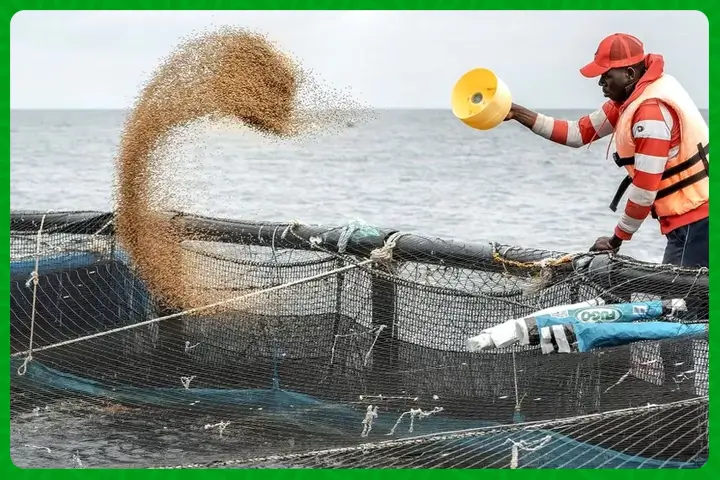
In the heart of Africa, where the challenges of nature have long dictated the ebb and flow of life, a remarkable transformation is taking place. Despite the formidable risks they face, fish farms are booming across the continent, reshaping its food landscape. From the depths of Lake Victoria to the shores of Kenya, enterprising aquaculturists are harnessing technology, expertise, and sheer determination to make fish farming not only profitable but sustainable. In this article, we explore the incredible rise of cage aquaculture in Africa and the innovative measures taken to mitigate the risks that come with it.
The Lurking Threat: Upwelling and Its Impact:
Africa’s largest lake, Lake Victoria, is both a bounty and a battleground. It’s here that we encounter a natural phenomenon called upwelling, a double-edged sword for fish farmers. Upwelling occurs when deep waters mix with surface water, causing a sudden depletion of dissolved oxygen and devastating fish populations. Thousands of fish met their untimely demise due to this recurring phenomenon, leaving farmers to grapple with the aftermath.
Potential Culprits: Algae and Pollution:
While the exact cause of upwelling remains elusive, some farmers suspect raised levels of algae or pollution may be contributing factors. Mr. Ochieng, an aquaculture entrepreneur who lost a significant portion of his tilapia stock, exemplifies the struggles faced by those in the industry. Despite losing 120,000 tilapia, Mr. Ochieng remains undeterred, highlighting the enormous risks that come with cage fish farming but also the tantalizing promise of profitability.
The Rise of Cage Aquaculture in Sub-Saharan Africa:
As wild fish stocks decline and the demand for fish surges, cage aquaculture has emerged as one of the fastest-growing food sectors in sub-Saharan Africa. According to a study published in Nature Food, the number of fish cages grew from a mere nine in 2006 to an astounding 20,000 by 2019. The industry has more than tripled in size in East Africa alone between 2017 and 2021, according to a report by Gatsby Africa.
The High-Tech Approach to Risk Mitigation:
Leading the charge in the fight against upwelling-related losses is Yalelo Zambia, the largest tilapia producer in Sub-Saharan Africa. Their CEO, Ulric Daniel, emphasizes the high-tech nature of the business. With the reliance on technology to monitor crucial factors like dissolved oxygen, pH values, and ammonia content, they can predict and mitigate the effects of upwelling before disaster strikes. It’s a data-rich approach that sets cage fish farming apart from other industries.
Victory Farms, Kenya’s largest caged fish producer, also leverages data extensively. With seven years of historical data, they can predict upwelling risk levels and adjust stocking densities and feeding accordingly, reducing stress on the fish.
Innovations to Overcome Challenges:
Innovations are a driving force behind the success of cage fish farming in Africa. Victory Farms, for instance, developed a mobile incubation system to transport live fish eggs to their hatchery, increasing their chances of survival. However, these innovations are often out of reach for smallholder farmers who lack the resources to invest in costly equipment and technology.
Dave Okech, chairman of the Cage Fish Farmers Association Kenya, underscores the importance of precise feeding and water temperature monitoring for healthier fish and cost savings. His company, AquaRech, is developing a system that monitors water temperature and advises farmers on feeding strategies based on this critical data.
Environmental Concerns and Responsible Farming:
Amid this burgeoning industry’s growth, there are valid concerns about the impact on the environment. Accumulated uneaten feed and fish feces under the cages pose risks to water quality. Responsible placement of fish cages in deep waters with adequate circulation is essential to mitigate these environmental challenges.
Despite the risks, fish farms are flourishing in Africa, driven by a growing demand for fish and innovative solutions to mitigate the challenges posed by natural phenomena like upwelling. Cage aquaculture, powered by technology and data-driven approaches, is transforming the continent’s food landscape. As the industry continues to grow, responsible farming practices will be crucial to ensure the sustainability of this vital sector, supporting both local economies and the environment.
Stay updated with the latest farming tips and agriculture industry news from Africa by subscribing to our newsletter. Don’t miss out on valuable insights and updates. Follow us on Twitter, LinkedIn, and Facebook to join our farming community and stay connected with us.



















